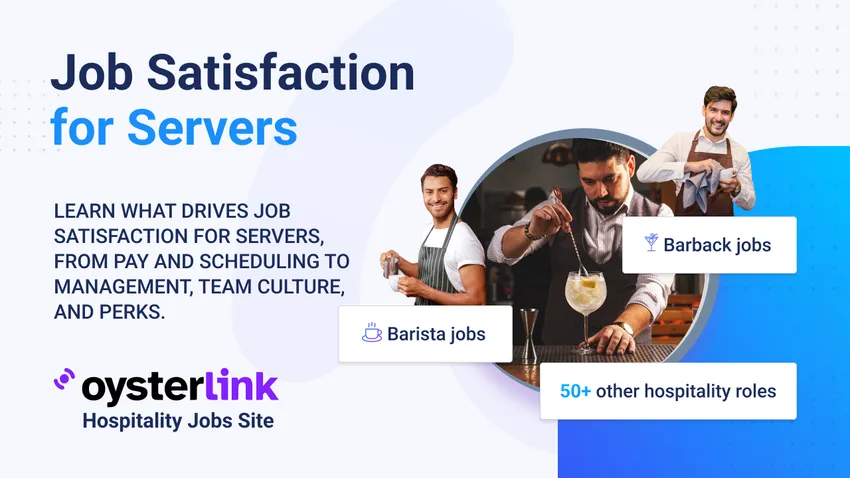A recent survey by Kuru found that 75% of food service workers say they are satisfied with their current working conditions.
In this article, we’ll break down the factors that matter most for Servers and what businesses can do to create a workplace where Servers want to stay.
1. Compensation and Tips: The Most Controversial Factor
No matter how much someone enjoys working as a Server, their paycheck is a major factor in job satisfaction. Unfortunately, many Servers feel underpaid.
According to CareerExplorer, food Servers rated their salary satisfaction at just 2.6 out of 5, with very few expressing contentment with their earnings.
While tips can significantly boost income, they also bring financial uncertainty. A slow night, bad weather or a downturn in business can lead to unpredictable pay.
Servers at upscale restaurants may earn more than those in casual dining, but income volatility remains a concern across the industry.
How can restaurants improve compensation satisfaction?
By addressing key aspects of pay and benefits, restaurants can create a more stable and motivating work environment. Here are some effective strategies:
- Offering a fair base pay: Raising base wages, even slightly, can provide financial stability and reduce stress.
- Providing transparent tip policies: Servers appreciate clarity in how tips are pooled, split or shared with other staff.
- Ensuring service charges and tip credits: Restaurants using service fees should ensure they still allow for competitive earnings.
- Offering bonus incentives: Offering performance-based bonuses or contests can help boost earnings and motivation.
2. Scheduling and Work-Life Balance: A Top Priority for Servers

Few things affect a Server’s daily life more than their schedule. Unpredictable hours, last-minute changes and double shifts can make it hard to plan personal time, leading to burnout.
Many Servers enjoy the flexibility of restaurant work, but they also need consistency to maintain a healthy work-life balance.
What restaurants can do
By prioritizing fairness and flexibility, restaurants can create a more supportive work environment. Here are some strategies to consider:
- Offer advance scheduling: Posting schedules at least two weeks in advance allows Servers to plan their time.
- Avoid excessive double shifts: Overworking staff can lead to exhaustion and high turnover.
- Be flexible with time-off requests: Accommodating personal commitments helps keep employees happy.
- Rotate shifts fairly: Ensuring everyone gets a mix of prime and slower shifts prevents resentment among staff.
3. Management and Workplace Culture: Leadership Matters
A Server’s experience in a restaurant is often shaped by their management. Poor leadership, favoritism and lack of communication can make even a high-paying job miserable, while supportive managers can turn a challenging environment into a rewarding one.
Ways to create a positive workplace culture
Fostering respect, clear communication and recognition can significantly enhance the work environment for Servers. Here are some key strategies to build a positive culture:
- Lead with respect: Managers who treat Servers as valued team members create a more positive work environment.
- Communicate clearly: Setting expectations, providing feedback and addressing concerns promptly prevents frustration.
- Recognize hard work: A simple thank-you, a shift drink or employee-of-the-month programs can boost morale.
- Handle conflicts fairly: Resolving workplace issues quickly and fairly helps maintain team harmony.
4. The Role of Team Dynamics: Co-Workers Make or Break the Job

A strong, supportive team can make even the toughest shifts enjoyable. On the other hand, a toxic work environment can drive talented Servers away.
Since restaurant work relies heavily on teamwork, the relationships between front-of-house and back-of-house staff play a crucial role in job satisfaction.
How to build a strong team culture
Creating a collaborative, supportive environment is key to a successful team. Here are some ways to strengthen team dynamics:
- Encourage collaboration: Servers, Bartenders and kitchen staff should work together, not against each other.
- Hire for attitude, not just skill: A positive, team-oriented Server can be more valuable than an experienced one with a bad attitude.
- Resolve conflicts quickly: Addressing workplace drama early prevents resentment and division.
- Foster team bonding: Occasional staff outings or shift meals can strengthen team relationships.
A well-functioning team makes the work environment more enjoyable and reduces turnover.
5. Training, Growth and Career Opportunities
Many Servers don’t see their role as just a short-term job. Those who stay in the industry often look for ways to develop their skills and advance. When restaurants invest in training and career growth, they not only improve service quality but also boost employee retention.
Ways to provide growth opportunities
Offering development and advancement options can motivate Servers and improve retention. Here are some strategies to help foster growth:
- Offer skill-building workshops: Training in wine knowledge, upselling or conflict resolution can enhance a Server’s expertise.
- Provide leadership opportunities: Giving experienced Servers a chance to train new hires or take on shift leadership builds engagement.
- Create pathways to advancement: Helping Servers transition into bartending, management or other roles encourages long-term commitment.
6. Employee Perks and Benefits: More Than Just a Paycheck

Pay isn’t everything — extra benefits can make a big difference in how Servers feel about their job. Restaurants that offer perks, even small ones, often see higher morale and lower turnover.
Perks that make a difference
Offering thoughtful benefits can greatly improve job satisfaction and well-being. Here are some perks that can have a positive impact:
- Free or discounted meals: A great way to show appreciation while ensuring staff is well-fed.
- Health benefits: Providing healthcare options, even partial coverage, can be a major incentive.
- Paid time off: Allowing rest days, especially for long-term employees, improves loyalty.
- Mental health support: Resources like employee assistance programs (EAPs) can help prevent burnout.
7. Restaurant Atmosphere and Customer Interaction
The physical work environment and customer interactions shape a Server’s day-to-day experience. Loud, chaotic or poorly designed spaces can make shifts stressful, while a well-organized, respectful setting leads to a more pleasant workday.
Ways to improve work environment
Creating a supportive and efficient space can make a big difference in a Server's experience. Here are some ways to enhance the work environment:
- Ensure an efficient layout: A well-thought-out floor plan reduces unnecessary stress for staff.
- Set clear customer behavior policies: Standing up for Servers against rude or inappropriate guests fosters a culture of respect.
- Create a positive dining atmosphere: A happy, welcoming environment benefits both staff and guests.
Final Thoughts
Attracting and retaining great Servers isn’t just about paying well — it’s about creating a workplace where employees feel valued.
Fair wages, flexible scheduling, supportive management and a positive work culture all contribute to higher job satisfaction for Servers.
For restaurant owners and managers looking to build a happy, motivated team, OysterLink can help.
From connecting restaurants with top talent to providing industry insights on wages and working conditions, OysterLink makes it easier to create a workplace where Servers want to stay.
By prioritizing job satisfaction, restaurants can improve retention, service quality and overall success. A happy Server is a better Server — and a better Server means a thriving business.









Loading comments...